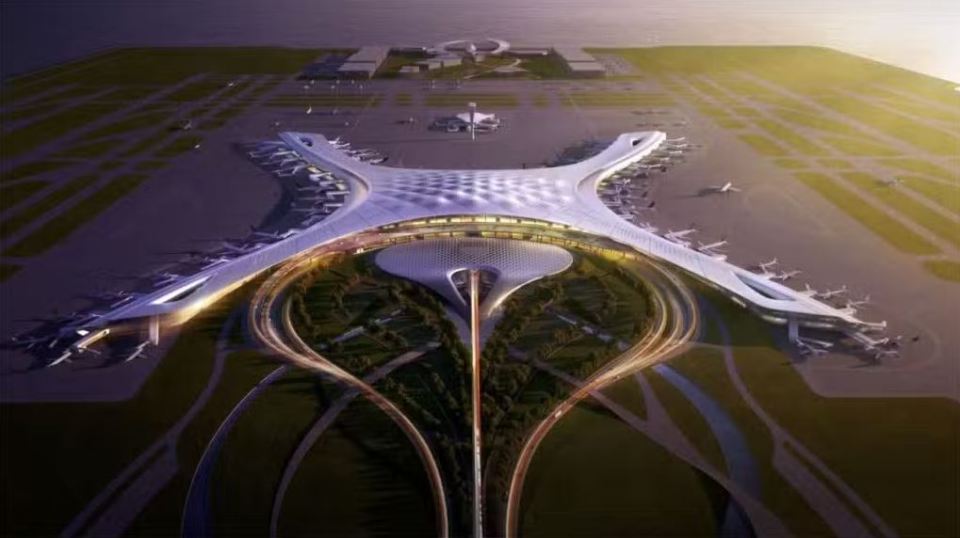CHINA has unveiled bold plans to build the world’s largest artificial island airport – costing an eye-watering £4 billion.
Designed to handle a staggering 80 million passengers annually, this ambitious development will surpass the likes of Hong Kong International Airport and Japan’s Kansai Airport in scale.
WeiboA £4billion project will see China having the world’s largest artificial island airport[/caption]
GettyThe country aims to reshape the skyline and bolster regional connectivity in northern China[/caption]
WeiboSet to be completed by 2035, the Dalian Jinzhouwan International Airport will be able to handle 80 million passengers every year[/caption]
Set to reshape the skyline and bolster regional connectivity, the project will transform an area spanning 20 square kilometres into a futuristic air hub, marking a new era in the country’s infrastructure development.
The Dalian Jinzhouwan International Airport – currently under construction – is set to be completed by 2035.
Once operational, the airport is expected to host one million tonnes of cargo, cementing its place as a key regional gateway for international and domestic travel.
Dalian, located in northeastern China, has long been a thriving coastal city with a population exceeding 6 million.
Its strategic position has fostered economic ties with neighbouring Japan and South Korea, and the city is a hub for oil refining, shipping, logistics, and tourism.
The new airport aims to bolster these industries further by improving connectivity and positioning Dalian as a regional air transport hub.
The Jinzhouwan Airport will feature four runways and a 900,000-square-metre (9.69 million sq ft) terminal.
Its initial passenger capacity of 43 million annually is expected to double in the coming years.
The new airport addresses limitations at the existing Dalian Zhoushuizi Airport, which was built during the Japanese occupation and is now constrained by its location in a valley surrounded by mountains.
The difficult terrain has made navigation challenging for pilots, particularly in poor weather conditions, and the airport has reached its capacity limit after multiple expansions.
Last year, it served 658,000 international passengers.
The artificial island location of Jinzhouwan Airport offers a solution to these challenges, providing more space for expansion and enhancing safety measures, the South China Morning Post reports.
Construction of the massive artificial island is already underway.
In August, the deep foundation treatment for a 77,000-square-metre reclaimed area was completed, a critical step in preparing the ground for building on soft or unstable soil.
By creating jobs, boosting tourism, and enhancing trade routes, the airport is expected to provide a significant boost to Dalian’s economy and solidify its position as a transportation and economic hub in northeast Asia.
China’s plan to build 22 new airports
CHINA’S ambitions in aviation go far beyond the groundbreaking Dalian Jinzhouwan International Airport.
As of mid-2024, the country is actively constructing 22 new airports, representing a total investment of $19.6 billion, according to CAPA-Centre for Aviation, a leading market intelligence firm in the aviation industry.
These projects are part of China’s broader push to expand its aviation infrastructure, driven by rising passenger demand and the government’s vision to create an interconnected domestic and international air network.
The scale of this expansion marks China’s strategic focus on improving regional connectivity and supporting economic growth in less-developed areas.
New airports are being built in key locations to reduce congestion at existing hubs and provide greater access to air travel in underserved regions.
These facilities will not only enhance passenger capacity but also strengthen cargo logistics, fuelling trade and economic development.
By 2035, China is expected to handle over 2 billion annual air passengers, according to the International Air Transport Association (IATA).
To meet this demand, the government has committed to increasing the total number of civil airports from 254 in 2022 to over 450 by 2035.
It comes after a record-breaking undersea passage is set to form the world’s longest and deepest road tunnel – at a whopping £36 billion cost.
The incredible mega-project will help cut a 21-hour journey by half via the 16-mile crossing.
Dubbed The Rogfast, this tunnel will stretch across Norway and help connect two important cities.
The incredible undersea subway will run between the municipalities of Randaberg and Bokn in Rogaland county.
A large body of water separates these two spots and requires locals to use ferries to get across.
This route would help to connect the southern city Stavanger to the more northern city of Bergen, according to World Highways.
WeiboThe new airport is expected to host one million tonnes of cargo[/caption]
WeiboIt will also have four runways and a 900,000-square-metre terminal[/caption]

